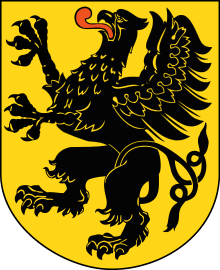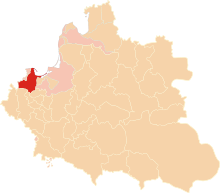Gdańsk Pomerania
For the medieval duchy, see Pomeranian duchies and dukes

Gdańsk Pomerania (Polish: Pomorze Gdańskie) or Eastern Pomerania (Polish: Pomorze Wschodnie; Kashubian: Pòrénkòwô Pòmòrskô) is a geographical region in northern Poland covering approximately the Pomeranian Voivodeship.
In Polish the area was called Pomorze (Pomerania) since the Middle Ages. In the early 14th century the Teutonic Knights invaded and annexed the region from Poland into their monastic state, which already included historical Prussia, located east of the region. As a result of the Teutonic rule, in German terminology the name of Prussia was also extended to annexed Polish lands like Gdańsk/Eastern Pomerania, although it was not inhabited by Baltic Prussians but Slavic Poles. After the area was reintegrated with Poland in 1466 both names were in use: "Pomerania" in the name of the Pomeranian Voivodeship and "Prussia" in the name of the province of Royal Prussia, which, however, also included other voivodeships with the historical areas of Chełmno Land, Michałów Land, Pomesania and Pogesania. After the Partitions of Poland the area was annexed by the Kingdom of Prussia and formed part of the newly established province of West Prussia, and the name Pomerania was not used by Prussian or German authorities in relation to this region.

The area was termed Polish Pomerania (Polskie Pomorze) since at least the 18th century[1] to distinguish it from Hither and Farther Pomerania, then outside of Polish rule. In the late 19th century this term was used in order to stress Polish claims to that area that was then ruled by the German Kingdom of Prussia.
Following World War I and Poland's independence, much of this area became part of the new Second Polish Republic and was organized into the Pomeranian Voivodeship. After World War II, Poland gained the remainder of the area including the city of Gdańsk. The current designations replaced Polish Pomerania since Farther Pomerania and a small part of Hither Pomerania were also ceded to Poland as part of the territories recovered from Germany.
Population
The indigenous population of the area are the Slavic Kashubians, who speak the Kashubian dialect of the Pomeranian language, the Kociewiacy and the Borowiacy. The Kashubians are organized in the Kashubian-Pomeranian Association.
Cities and towns
|
|
|
|
|
See also
- History of Pomerania
- History of Gdańsk
- Eastern Pomerania (disambiguation)
- Dukes of Pomerania
- Royal Prussia
- West Prussia
- Pomeranian Voivodship
References
- James Boswell, The Scots Magazine, t. 35, Edinburgh 1773, p 687 Google Books, The Magazine of Magazines t. 13, Limerick 1757 p. 158 Google Books, John Mottley, The history of the life of Peter I., emperor of Russia, London 1739, p. 89 Google Books, The Universal Magazine, t. 20, London 1757, p. 50 Google Books